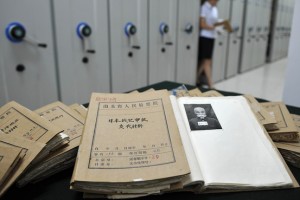5:25 am HKT Aug 19, 2014 CULTURE
By Maura Cunningham
 The original document of Japanese war criminals in Jinan, Shandong Province.The Shandong Provincial Archives would reveal archives of ten Japanese war criminals since Aug. 15. Zuma Press
The original document of Japanese war criminals in Jinan, Shandong Province.The Shandong Provincial Archives would reveal archives of ten Japanese war criminals since Aug. 15. Zuma Press
At last week’s meeting of the Historical Society for Twentieth-Century China in Taipei, roughly 200 historians from Asia, the United States and Europe gathered to share their latest research. But during lunch hours and coffee breaks, the one question that kept popping up wasn’t about any given paper or project. Instead it was: “How’s your archival access been lately?”
This wasn’t just idle conference chitchat.
Over the past few years, historians of China have grown increasingly worried about changes they’ve seen at Chinese archives that threaten to impede understanding of China at a time when such understanding is taking on a growing importance. Many archives in mainland China have been tightening access and imposing new restrictions on scholars, which can make conducting academic research in China a time-consuming and frustrating experience.
At the Dissertation Reviews website, which provides information about archival access in countries around the world, students of Chinese history have written in to warn fellow scholars about new regulations that make navigating the archives trickier than before. The Shanghai Municipal Archives (SMA) is now enforcing a long-ignored requirement that foreign researchers affiliate with and present a letter of introduction from a Chinese university or research institute when registering at the archives. While that may seem like a reasonable and minor bureaucratic requirement, securing such an affiliation can be both onerous and expensive (the Shanghai Academy of Social Sciences, where I’ve been a visiting scholar for nearly two years, charges me a hefty “administrative fee” every month for this affiliation).
The SMA has also stopped allowing researchers to photocopy paper documents. It still permits the printing of files that are digitized or on microfilm, but archivists have discretion in approving printing requests.
